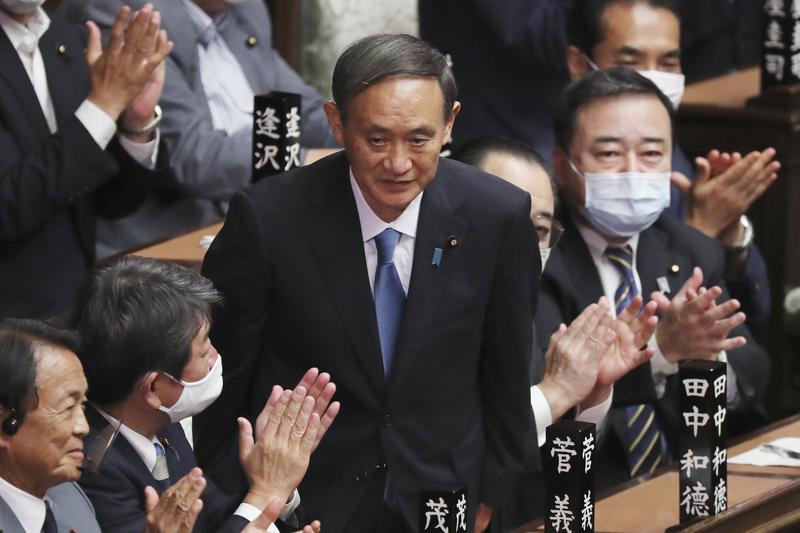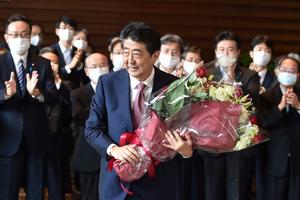 Yoshihide Suga is applauded after being elected as Japan's new prime minister at parliament's lower house in Tokyo, Sept 16, 2020. (PHOTO / AP)
Yoshihide Suga is applauded after being elected as Japan's new prime minister at parliament's lower house in Tokyo, Sept 16, 2020. (PHOTO / AP)
TOKYO - Japan’s Yoshihide Suga was voted prime minister by parliament on Wednesday to become the country’s first new leader in nearly eight years, appointing a new cabinet that kept about half of the familiar faces from predecessor Shinzo Abe’s lineup.
Suga, 71, Abe’s longtime right-hand man, has pledged to pursue many of Abe’s programmes, including his “Abenomics” economic strategy, and to forge ahead with structural reforms, including deregulation and shutting down bureaucratic turf battles.
Abe, Japan’s longest-serving premier, resigned because of ill health after nearly eight years in office. Suga served under him in the pivotal post of chief cabinet secretary, acting as top government spokesman and coordinating policies.
Suga, who won a ruling Liberal Democratic Party (LDP) leadership race by a landslide on Monday, faces a plethora of challenges, including tackling COVID-19 while reviving a battered economy and dealing with a rapidly aging society.
Suga, who won a ruling Liberal Democratic Party (LDP) leadership race by a landslide on Monday, faces a plethora of challenges, including tackling COVID-19 while reviving a battered economy and dealing with a rapidly aging society
ALSO READ: Japan's Suga to promote diplomacy with Asian neighbors
About half of the new cabinet are carryovers from Abe’s administration. Only two are women and the average age, including Suga, is 60.
Among those retaining their jobs are key players such as Finance Minister Taro Aso and Foreign Minister Toshimitsu Motegi, along with Olympics Minister Seiko Hashimoto and Environment Minister Shinjiro Koizumi, the youngest at 39.
“It’s a ‘Continuity with a capital C’ cabinet,” said Jesper Koll, senior adviser to asset manager WisdomTree Investments.
Abe’s younger brother, Nobuo Kishi, was handed the defence portfolio, while outgoing Defence Minister Taro Kono takes charge of administrative reform, a post he has held before.
Yasutoshi Nishimura, Abe’s point man on COVID-19 response, remains economy minister, while Trade and Industry Minister Hiroshi Kajiyama, the son of a politician to whom Suga looked up as his mentor, also retains his post.
Yoko Kamikawa, a graduate of Tokyo University who received a master’s degree from Harvard, has been named the justice minister. She was first elected to the lower house of parliament in 2000 and has previously served as gender equality minister and justice minister. In her previous term as justice minister, she approved carrying out the death penalty 16 times.
 Japan’s outgoing Prime Minister Shinzo Abe, center, holds a bouquet of flowers as he bids farewell to staff members after the last cabinet meeting in Tokyo on Sept 16, 2020. (PHOTO / AFP)
Japan’s outgoing Prime Minister Shinzo Abe, center, holds a bouquet of flowers as he bids farewell to staff members after the last cabinet meeting in Tokyo on Sept 16, 2020. (PHOTO / AFP)
Rough road ahead
Katsunobu Kato, outgoing health minister and a close Suga ally, takes on the challenging post of chief cabinet secretary. He announced the cabinet lineup.
Tomoya Masanao, head of investment firm PIMCO Japan, said Suga’s goal of a more digitalised society could widen the gap between rich and poor and would require political capital.
“Abe’s administration built political capital for itself with loose monetary and fiscal policies, a balanced and skillful diplomacy with the United States and China, and implementation of flexible domestic politic,” he said. “The new administration, on the other hand, faces a rough road ahead.”
READ MORE: Japan's Suga preparing cabinet, continuity in foreground
In a move that resonates with voters, Suga has criticised Japan's top three mobile phone carriers, NTT Docomo Inc, KDDI Corp and SoftBank Corp , saying they should return more money to the public and face more competition.
He has said Japan may eventually need to raise its 10 percent sales tax to pay for social security, but not for the next decade.
Clues as to whether and how Suga will push ahead with reforms could come from the lineup of government advisory panels such as the Council on Economic and Fiscal Policy, Koll said.
“The ambition of Mr. Suga to speed up and reinvigorate the process (of reform) is absolutely clear, but the next layer of personnel will be interesting,” he said.
Speculation has simmered that Suga might call a snap election for parliament’s lower house to take advantage of any rise in public support, although he has said handling the pandemic and reviving the economy were his top priorities.


